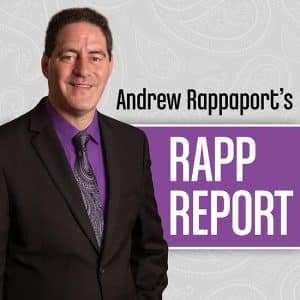Andrew Rappaport's Rapp Report

Church, Part 2 of What We Believe, Part 37
 Rapp Report episode 264
Rapp Report episode 264Andrew Rapport and Pastor Steven Dew explore the church’s foundation in this episode. Discuss when the church started and what it is, why doctrine divides yet also unifies, and how a lengthy and detailed doctrinal statement can help you look for a good church. They discuss the formation of the church, known as the body of Christ, beginning on the day of Pentecost and concluding at the rapture. They distinguish between the two main camps of theology: dispensationalism and covenant theology, and further explain that the term “church” has changed over time and that the body of Christ started on the day of Pentecost, meaning there is a distinct difference between Israel and the church. They emphasize the importance of humility in theology, noting that when one sits at the feet of Christ, He will correct everyone’s views. They explore the topics of covenant theology and dispensationalism, specifically in relation to the formation and end of the church. Lastly, they discuss the unique spiritual organism of the church, distinct from man-made systems.
Chapters:
(0:09:05) – Distinguishing the Church and Israel
(0:20:16) – Humility in Theology
(0:24:44) – Covenant Theology and Dispensationalism
(0:32:20) – Distinctive Characteristics of the Church
(0:45:26) – Misapplied Church Discipline and Pride
(0:50:43) – The Importance of a Diocesan Statement
Chapter Summaries:
(0:09:05) – Distinguishing the Church and Israel (11 Minutes)
This episode covers the formation of the church, known as the body of Christ, beginning on the day of Pentecost and concluding at the rapture. The conversation distinguishes between the two main camps of theology: dispensationalism and covenant theology. It explains that the term “church” has changed over time and that the body of Christ started on the day of Pentecost, meaning that there is a distinction between Israel and the church. The speaker further explains that both covenant theology and dispensationalism are systems of interpretation and have their end times views.
(0:20:16) – Humility in Theology (4 Minutes)
The conversation focused on the difficulty of fitting into one theological camp or another when reading the Bible. It was discussed that even if John MacArthur or RC Sprowl influences one, there will still be areas of disagreement. Ultimately, it was brought to attention that pride must not be taken in one’s theological system, as when one sits at the feet of Christ, He will correct everyone’s views. It was suggested that those who may have tuned out the conversation due to certain words should have still listened, as the point was to not be prideful about one’s theological system.
(0:24:44) – Covenant Theology and Dispensationalism (8 Minutes)
This conversation covers the topics of covenant theology and dispensationalism, specifically in relation to the formation and end of the church. Andrew highlights the differences between the two views, noting that there is much agreement between them and that the church will end with the rapture. He also touches on the end times, noting that the church’s completion will lead to a transition back to national Israel and that some who were not Jewish will be saved.
(0:32:20) – Distinctive Characteristics of the Church (13 Minutes)
This conversation explores the unique spiritual organism of the church, as distinct from man-made systems, which are made up of all born-again believers in this present age, between Pentecost and Rapture. The church is distinct from Israel and is a mystery not revealed until this present age. The body of Christ is a living organism, and the Word of God is alive and active.
(0:45:26) – Misapplied Church Discipline and Pride (5 Minutes)
They discuss the application of Matthew 18. Jesus is addressing the disciples’ pride and telling them to be like a child when it comes to humility. They then delve into the issue of discipline, mainly when someone is unwilling to repent. It also touches upon disagreements about being mistaken for sin and the need to define slander properly.
(0:50:43) – The Importance of a Diocesan Statement (7 Minutes)
This conversation explored the importance of understanding and adhering to a church’s doctrinal statement to bring unity to the church. They discussed the need to check in with church members to ensure they align with the statement and hold them accountable when they teach or believe things contrary to the church’s beliefs. They also touched on the need for a scripture-based doctrinal statement, wide enough to allow for disagreement but specific enough to disqualify those who don’t adhere to it.
Listen to the last episode in the series:
Church, Part 1 of What We Believe, Part 36
This podcast is a ministry of Striving for Eternity and all our resources
Listen to other podcasts on the Christian Podcast Community
Fill out our survey about this show
Give us your feedback, email us info@StrivingForEternity.com
Get the book What Do They Believe
Get the book What Do We Believe
Sponsors:
Logos Bible Software
MyPillow or call (800) 873-0176 and use promo SFE






 Visit Podcast Website
Visit Podcast Website RSS Podcast Feed
RSS Podcast Feed Subscribe
Subscribe
 Add to MyCast
Add to MyCast